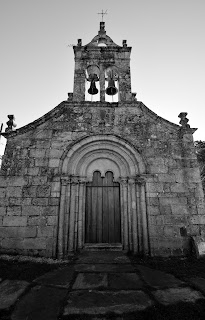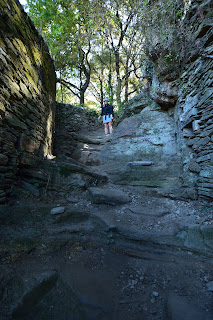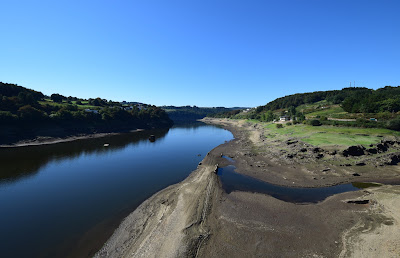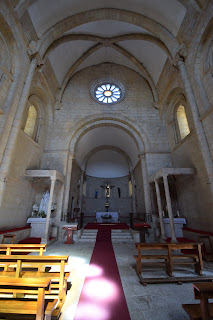As a result of this
transformation in our experiences, a discussion soon arose about the nature of pilgrimage
and about what it is to be a "real pilgrim". Many of the people we have been walking with since SJPP were
adamant that "real pilgrims" have to endure the physical challenges of
the entire trail. However, that line of discussion inevitably led to the question of
what is the entire trail? It made us wonder if we seemed equally naive at the beginning of our journey to pilgrims who began in Germany, France, or beyond. This debate went on and on in circles. I think I am amazed at myself in the midst of these debates. I
had hoped that this pilgrimage had made me a better person, but today I
realized how quick I still am to judge others in my head. I still have a long way to go. We all walk our own Camino, as do those fortunate enough to
be able to join the way in Sarria.
Amidst all this is the very depressing sense that we are nearly done. To people just beginning, 100 km seems like a huge distance, but to those who have already crossed 600 or more kilometres, it means we only have about 4 days of walking together left. As a result, we felt ourselves and our fellow hikers slow down today, taking far more breaks than usual, and spending way more time in each place than necessary, just to hang out with each other. This too marked a stunning transformation in how many of us approached the pilgrimage.
As to the physical trail, today we hiked through the villages of Barbadelo, Morgade, Ferrerios, Momientos, and Villacha. The
town of Barbadelo was a collection of red albergues, pilgrim
gift shops, and a beautiful church, the Iglesia de Santiago.
Along
the way, we also began to see more of the Spanish Horreo. These are
historical granaries that are built of stone with tile roofs, raised
off the ground by pillars in order to stop rodents from eating the harvested crops stored inside.
Camino Commercialism
We enjoyed a break for cafe con leche
and pie at a roadside bar with fellow pilgrims in Ferrerios and took yet
another break in Villacha to simply enjoy the moment. By
this point the number of items with shells on them had become a little
daunting - garbage cans, toilet paper, Coke machines, sewer covers....
For most of the day, the path continued on past beautiful open pastures, and along stone-walled lines of trees.
At
noon we met a man who has lived as a pilgrim and now wanders the Caminos
of Europe with his donkey - a beautiful and humbling sight.
Dauntingly
the Camino markers now described the distance left to Santiago with a precision of three decimal places, and they occurred with depressing frequency. When we passed the well-photographed 100 km marker it
was covered in graffiti and inscribed with the location.
Roman Routes on the Camino
As we neared our
destination for the day, we came to a break in the trail which gave us
the option of taking a short detour along a roadway or walking the well-worn historical route. Here we opted for the
historical route which was purportedly an old Roman road, so worn in
spots that you could see footprints worn into the rocks! While this trail was a steep and uncertain route, it was nonetheless short and awe-inspiring.
Soon
afterwards we crossed a huge bridge over the Minho River, walked up a steep staircase, and passed through the pilgrim gate into the city of
Portomarin.
Warm from our hike, which had taken us
into the afternoon's rising temperatures, we checked into the first
residence we came to on the main street, the Albergue Pasino a Pasino. This
residence features a large communal kitchen and eating area,
comfortable hammocks in the backyard, and relaxing small semi-private
rooms with between 2 and 4 bunks. We were given a room containing one bunk bed and one single bed. As
a result, we shared a room with an Australian lady who we had often
seen and only briefly talked to over the past several weeks. Once shown our room, we performed our usual routine of showering, doing our laundry, and heading out into town to explore.
We enjoyed a late
lunch in a cafe located off the town's spacious and clean main square -
the Pazo del Conde de la Maza, where the realities of a new batch of
pilgrims set in. While striving to order, Sean
was roughly pushed and yelled at by an older gentleman telling him that
"he was a pilgrim who had hiked over 20 kilometres today so he deserved
to order his food first...". Seemingly not
understanding that almost everyone else at the bar and in town had hiked
just as far or further today, this pilgrim loudly exclaimed to all
who passed that he was "an authentic pilgrim who had completed a huge
hike that day." The truth is that I have no words
to describe the situation, and soon discovered that many of our friends
had had similar experiences in the past couple of days. As the John Brierley guide to the Camino Frances extolled, regarding these new pilgrims:
"Note for 'seasoned' pilgrims: Beware of
signs of irritation at the intrusion on 'my' Camino - remember that many
of the new arrivals may be nervous starting out and the last thing they
need is aloofness built on a false sense of superiority. A loving pilgrim welcomes all they meet along the path with an open mind and open heart without judgment."
After our break, and
with this advice in mind, we enjoyed a couple of hours in the unique
church at the centre of Portomarin. The Igrexa de San Juan de
Portomarin is a large church fascinatingly shaped like a rectangular
castle, set in the centre of the town plaza. It
has a cool interior, which brings welcome relief to wary hikers, as
well as providing silence from the busier courtyard outside, which seems
to double as the turnaround junction for pilgrimage tour bus companies. Outside
the church is a beautiful Celtic Cross, the Cruceiro de San Nicolas,
which is well worth the time to visit and admire.
With little else
to explore beyond the main town plaza in Portomarin, we spent much of our afternoon
simply sitting and relaxing in the shade of the church. Here we met
several now-familiar Canadian and American pilgrims who advised that a
bar on the edge of town had a wonderful vegetable plate, which we
decided to try for our evening meal. As a result,
we went to the restaurant in the Hotel Ferramenteiro, where we enjoyed dinner and wine on the balcony, along with a beautiful view of the
region and a cool breeze washing over us.
Later we spent the rest of our
evening sitting on the edge of town watching the sunset, enjoying the
cool breeze which came down the waterway, and photographing the tranquil
village at night.
As night settled on
Portomarin we wandered back to albergue and were struck by the huge
number of moving trucks and tour buses which now lined the main square,
all unloading huge amounts of luggage and pilgrims. We
walked past this chaos and attended the pilgrim mass from 8-9 PM, soon
after which we were back in the Albergue writing postcards, and preparing for our trek tomorrow to Palas de Rei.
There
are only approximately 75 km left until our arrival in Santiago - a
prospect which is both exciting and terrifying to both of us, as the
trip has now passed so quickly, and neither of us is sure we have found
what we were looking for.
"Always pay attention. you don't meet people by accident and stuff doesn't happen by coincidence. Everything has a meaning if you take the time to see it."
___________________________________________________________________________________
Practical information:
Distance: 22.1 km
Max Temperature: 25°C
Accommodations: Albergue Pasino a Pasino (10 Euros/person)

























































Comments
Post a Comment